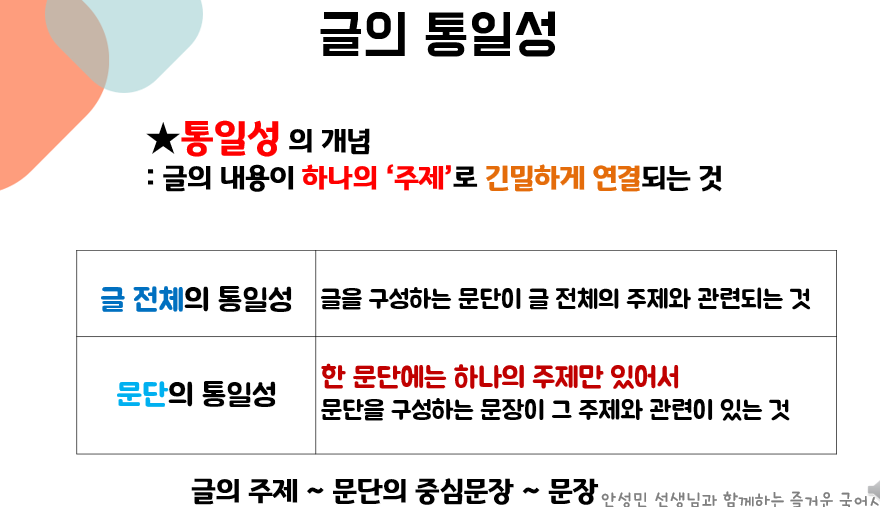Overcoming TOPIK Traps 30-Day Project(26) _글의 통일성 함정! : "coherence of a text trap"
TOPIK 함정 돌파 30일 작전 TOPIK Trap Buster 30-Day Project

안녕하세요, 학습자 여러분! 오늘은 한국어 쓰기 능력의 꽃이라 할 수 있는 '글의 통일성'에 숨겨진 함정을 파악하고, 이를 극복하는 방법을 알아볼 시간입니다. TOPIK 쓰기 영역에서 높은 점수를 얻기 위해서는 단순히 문법과 어휘를 아는 것을 넘어, 논리적이고 일관된 글을 쓰는 것이 중요합니다.
Hello, learners! Today, we're going to identify the traps hidden within 'coherence of a text,' which is the pinnacle of Korean writing ability, and learn how to overcome them. To achieve a high score in the TOPIK writing section, it's crucial to write a logical and consistent text, going beyond simply knowing grammar and vocabulary.
특히 54번 문제처럼 긴 글을 작성할 때, 글의 주제에서 벗어나거나 문단 간 연결이 자연스럽지 않아 감점되는 경우가 많습니다. 오늘의 훈련을 통해 제시된 주제를 정확히 이해하고, 각 문단이 유기적으로 연결되도록 하는 '글의 통일성' 함정을 완벽히 정복해 봅시다.
Especially when writing a long essay like question 54, many points are lost due to veering off the main topic or having unnatural connections between paragraphs. Through today's practice, let's completely conquer the 'coherence traps' by accurately understanding the given topic and ensuring that each paragraph is organically connected.
26일차: 쓰기: '글의 통일성' 함정 파악 Writing: Identifying 'Coherence' Traps
TOPIK 쓰기 문제는 논리력을 평가하는 영역입니다. 문법과 어휘만큼이나 글의 논리적 흐름이 중요하죠!
The TOPIK writing section assesses logical reasoning. The logical flow of the text is just as important as grammar and vocabulary!
실전 문제 풀이: 글의 통일성 함정 극복하기 Practice: Overcoming Coherence Traps
세트 1. 다음 글에서 논리적으로 어색한 문장을 고르시오.
(가) 오늘날 청소년들은 이전 세대보다 훨씬 더 많은 스트레스에 시달리고 있다. (나) 학교에서는 치열한 경쟁에 내몰리고, 가정에서는 부모님의 높은 기대에 부응해야 한다. (다) 게다가 스마트폰 사용 시간이 길어지면서 수면 부족을 겪는 학생들도 늘고 있다. (라) 이러한 스트레스는 청소년들의 정신 건강뿐만 아니라 신체 건강에도 악영향을 미친다. (마) 따라서 청소년들이 미래 사회의 건강한 구성원으로 성장하도록 돕기 위해서는 사회적인 관심과 지원이 필요하다.
1) (나) 2) (다) 3) (라) 4) (마)
정답: 2) (다)
해설 및 분석: (가) 문장은 청소년의 스트레스를 주제로 제시하고 있습니다. (나)는 학교와 가정에서 받는 스트레스의 구체적인 원인을 설명합니다. (라)는 이러한 스트레스의 결과를 이야기합니다. (마)는 문제 해결을 위한 방안을 제시합니다. 그런데 (다)는 '스마트폰 사용 시간'이라는 새로운 원인을 제시하지만, 이는 글의 전체적인 흐름, 즉 '학교 및 가정에서 오는 스트레스'라는 주제와 통일성을 해칩니다. 스마트폰 사용은 또 다른 종류의 문제일 뿐, 앞선 문장의 맥락과 직접적인 인과관계가 없습니다.
Analysis: Sentence (가) presents the topic of youth stress. (나) explains the specific causes of stress from school and home. (라) discusses the results of this stress. (마) suggests solutions for the problem. However, (다) presents a new cause, 'smartphone usage time,' which breaks the coherence of the overall flow, specifically the topic of 'stress from school and home.' Smartphone use is simply another type of problem and does not have a direct causal relationship with the context of the preceding sentences.
주요 어휘 및 문법 Core Vocabulary & Grammar
1. 어휘: 통일성 (統一性) Vocabulary: Coherence/Consistency
통일성 (統一性) [tong-il-seong]
의미: 여러 부분이나 요소가 하나의 목적이나 원리에 따라 일관되게 연결되어 있는 상태.
Meaning: The state where various parts or elements are consistently connected according to a single purpose or principle.
예문:
글의 통일성을 유지하기 위해 불필요한 문장은 삭제해야 한다. (To maintain the coherence of the text, unnecessary sentences must be deleted.)
이 보고서는 논리의 통일성이 부족해서 설득력이 약하다. (This report lacks logical consistency, so its persuasive power is weak.)
2. 어휘: 논리적 (論理的) Vocabulary: Logical
논리적 (論理的) [nol-li-jeok]
의미: 논리(logic)에 맞는 것. 앞뒤 관계나 원리가 분명한 것.
Meaning: Something that conforms to logic; something with a clear cause-and-effect relationship or principle.
예문:
그의 주장은 매우 논리적이어서 반박하기 어려웠다. (His argument was very logical, so it was difficult to refute.)
문제를 해결하려면 논리적으로 접근해야 합니다. (To solve the problem, you must approach it logically.)
3. 어휘: 함정 (陷穽) Vocabulary: Trap
함정 (陷穽) [ham-jeong]
의미: 짐승을 잡기 위해 땅에 판 구덩이나, 속이기 위해 마련된 수단.
Meaning: A pit dug in the ground to catch an animal, or a deceptive means prepared to deceive someone.
예문:
TOPIK 시험에는 숨겨진 함정이 많으니 주의해야 한다. (There are many hidden traps in the TOPIK exam, so you must be careful.)
그 제안은 좋은 것처럼 보이지만, 함정일 수 있다. (That proposal looks good, but it might be a trap.)
1. 문법: ~에 시달리다 Grammar: To suffer from/be tormented by
~에 시달리다 [~e si-dal-li-da]
의미: 어떤 고통스러운 상황이나 어려움에 계속해서 괴롭힘을 당하다는 의미. 주로 부정적인 상황에 쓰입니다.
Meaning: To suffer or be tormented by a difficult or painful situation continuously. It is primarily used in negative contexts.
예문:
그는 과도한 업무에 시달리고 있다. (He is suffering from an excessive workload.)
가뭄에 시달리는 농민들을 돕기 위한 지원책이 필요하다. (Support measures are needed to help farmers who are suffering from drought.)
2. 문법: ~에 부응하다 Grammar: To meet/respond to
~에 부응하다 [~e bu-eung-ha-da]
의미: 상대방의 기대나 요구, 필요 등에 맞춰 행동하거나 응하는 것을 의미합니다.
Meaning: To act or respond in a way that meets someone's expectations, demands, or needs.
예문:
우리 팀은 고객의 높은 기대에 부응하기 위해 최선을 다했다. (Our team did its best to meet the high expectations of the client.)
정부는 국민의 요구에 부응하여 새로운 정책을 발표했다. (The government announced a new policy in response to the demands of the public.)
3. 문법: ~을/를 넘다 Grammar: To go beyond/exceed
~을/를 넘다 [~eul/reul neom-da]
의미: 기준이나 한계를 초과하거나, 어떤 단계나 수준을 뛰어넘는 것을 의미합니다.
Meaning: To exceed a standard or limit, or to surpass a certain stage or level.
예문:
그는 단순한 기술자를 넘어 예술가로 평가받았다. (He was evaluated as an artist, going beyond a simple technician.)
기대를 넘는 성과에 모두가 놀랐다. (Everyone was surprised by the performance that exceeded expectations.)




